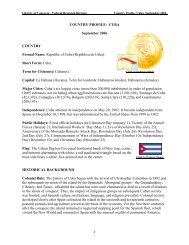1 - American Memory
1 - American Memory
1 - American Memory
You also want an ePaper? Increase the reach of your titles
YUMPU automatically turns print PDFs into web optimized ePapers that Google loves.
14<br />
Recent West Coast strikes have proved highly injurious to Hawaii's people<br />
and economic health. For 179 days between July 1,1971 and the end of 1972—six<br />
months out of 18, or one day out of every three—non-military shipping between<br />
Hawaii and the West Coast was shut down by longshore and maritime strikes.<br />
For 134 days during that period, a West Coast longshore dispute closed all ports<br />
In Washington, Oregon and California.<br />
As a direct result, thousands of workers in Hawaii across a broad spectrum<br />
of enterprises were laid oflf or placed on shortened workweeks. Unemployment<br />
rose to 6.5 per cent in February 1972, the highest point in Hawaii's history as a<br />
State.<br />
Prices rose precipitously because of shortages and added air freight costs.<br />
Even with the Phase I wage-price freeze that began August 14, 1971, Honolulu<br />
food prices climbed 4.5 per cent between June and October, while nationwide<br />
food prices actually declined 0.3 per cent. By February 1072—after 115 cumula-<br />
tive days of strike and despite relief through an 80-day Taft-Hartley injunction<br />
and two voluntary extensions—a head of lettuce cost 72 cents, a dozen oranges<br />
$1.46, and 10 pounds of potatoes $2.28 on the average.<br />
Savings were depleted. Residential and commercial construction slowed. Fed-<br />
eral and State tax collections dropped, and many businesses, unable to resupply,<br />
closed their doors forever.<br />
Shipping tieups also have ."serious long-range repercussions on the State of<br />
Hawaii. The principal impact is to make it more diflBcult to attract investment<br />
capital. For the last twenty years or more, the economic growth of Hawaii has<br />
been financed in large measure by capital attracted from outside the State.<br />
This Is true for three reasons: The first is that even if most savings of Hawaii<br />
residents were kept in liquid form and invested locally, our rate of growth has<br />
been such that such funds would be inadequate. The second reason is that more<br />
and more savings of Hawaii residents are in fact being funneled into U.S. Main-<br />
land Institutions, such as insurance companies, mutual funds, the stock and<br />
bond market, and so on. Third, more and more of Hawaii business enterprise is<br />
owned by out-of-state coriwrations. so that profits made in Hawaii are not always<br />
reinvested locally but are returned to a home office located on the U.S. Mainland<br />
or in a foreign country.<br />
Personal savings and business profits, therefore, tend to flow out of Hawaii,<br />
and the economic development of the State depends upon local ability to attract<br />
outside investment funds. Naturally the capacity to attract such funds is dealt<br />
a severe setback when a transportation shutdown shakes investor confidence.<br />
Also, and very Importantly, shipping strikes imperil or destroy markets for<br />
Hawaii's export industries. The primary market for Hawaiian sugar, for in-<br />
stance, is in the Western States, where sugar is already In surplus. In the past,<br />
the Hawaii sugar producers have lost Important industrial customers because<br />
maritime and longshore disputes have interrupted normal shipments and turned<br />
customers to other sources of supply.<br />
The salt in the wound when Hawaii suffers from a West Coast shipping tieup,<br />
however, lies in the fact that such disputes do not originate in Hawaii, have<br />
no participants in Hawaii, and are remote from any direct Influence which might<br />
be exerted by our local labor unions and management and the people of Hawaii<br />
Hawaii's traditional role has therefore lieen to become the hostage of such far-<br />
away disputes.<br />
The Hawaii exemption legislation under consideration by this SulK-ommlt-<br />
tee quite consciously avoids dealing with strikes and lockouts in Hawaii itself.<br />
These local disputes involving our own labor unions and management are sub-<br />
ject to Hawaii statutory remedies and to direct influence from public opinion<br />
within the State. Like every other State, we in Hawaii will continue to cope<br />
with work stoppages within our own borders.<br />
The exemption provided in this bill would assure a secure ocean lifeline for<br />
Hawaii and the U.S. Pacific islands. Yet the Impact of the exemption would<br />
be very minimal on the parties to a West Coast longshore or maritime dispute.<br />
An exemption for Hawaii would involve only a small fraction of the number<br />
of longshore hours worked on the West Coast. A recent study Indicates that<br />
approximately 3 per cent of all man-hours worked at West Coast ports was<br />
exi)ended on the handling of cargoes originating nt nr destined for Hawaiian<br />
ports. By adding Guam, <strong>American</strong> Samoa and the Trust Territory of the Pacific<br />
Islands, this figure is increased to only about SH per cent. Of the shipi)oard<br />
labor with West Coast contracts, only about 7.3 per cent of the total man-days<br />
worked would be Involved.



![Albert Einstein Papers [finding aid]. Library of Congress. [PDF ...](https://img.yumpu.com/21604228/1/190x245/albert-einstein-papers-finding-aid-library-of-congress-pdf-.jpg?quality=85)





![American Colony in Jerusalem Collection [finding aid]. Library of ...](https://img.yumpu.com/17941275/1/190x245/american-colony-in-jerusalem-collection-finding-aid-library-of-.jpg?quality=85)



![Piccard Family Papers [finding aid]. - American Memory - Library of ...](https://img.yumpu.com/17941234/1/190x245/piccard-family-papers-finding-aid-american-memory-library-of-.jpg?quality=85)


